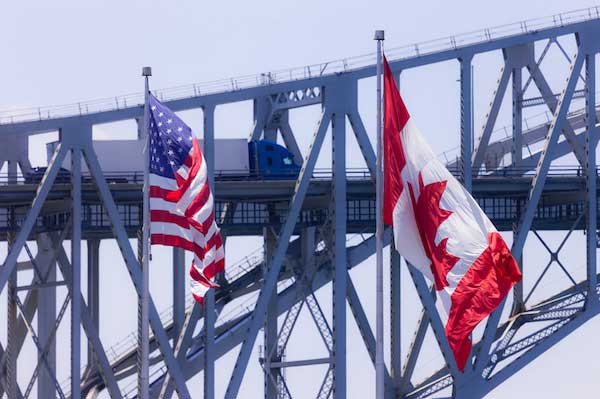The collateral damage from the current trade tensions is surprisingly wide-ranging. For example, so many Canadians have cut short or cancelled winter travel to the U.S. that the country’s three major telecom companies have experienced as much as a 15% decline in roaming charge revenues.
MSNBC aired a warning that declining China trade could mean a shortage of fireworks for America’s 250th anniversary celebrations.
But what is more mainstream are the fears of restrictive and intrusive application of border controls, which are frequently impacting those involved with academic gatherings. In March, Nathan Kalman-Lamb, an associate professor of sociology at the University of New Brunswick in Fredericton and former lecturer at Duke University, was detained trying to enter the U.S. He has a 10-year B1/B2 visa issued in 2025 stamped in his passport. Yet a Customs and Border Protection official at Montreal’s Trudeau International Airport U.S. pre-clearance detained him for three hours, questioning whether he “had ever participated in ‘violent protest.’”
“They also questioned whether I had ever visited a list of a dozen Muslim-majority countries or Israel,” he said. “They searched my phone and all my luggage—meticulously going through every page of my book, every item in my wallet, unfurling every sock.”
As a result, Kalman-Lamb was a day late arriving at the College Sport Research Institute annual meeting at the University of South Carolina and “missed a significant chunk of the conference.”
His experience was widely covered in Canada, where the Canadian Association of University Teachers issued a warning to members against non-essential travel to the U.S. due to the “political landscape.”
The North American Society for the Sociology of Sport (NASSS) is a group that found a creative, adoptable solution to the border issue. President-elect Professor Travers (they don’t use a first name) of Simon Fraser University, Vancouver, says NASSS, which has a conference booked for Seattle in November, is creating a new-style hybrid conference.
“I love Seattle, but in February, with Trump’s threats to annex Canada and the tariffs, I started to have anxiety about traveling to the United States,” Travers says. “As a trans person, I don’t know if they’re going to let me in.”

Travers also worried that many NASSS members who are attached to universities or independent scholars may have entry issues. Plus, Travers heard an organizer of a conference in Victoria called Moving Trans History Forward mention that 40% of the expected attendees weren’t coming.
“Those were the Americans worried about what will happen when they attempt to return to the United States,” Travers says.
Like other groups, NASSS has Zoomed and treasures face-to-face. Since canceling Seattle to relocate to Canada would trigger a $71,000 penalty, Travers and the current president negotiated a scaled-back event with their host hotel.
“We decided to offer a parallel conference in Vancouver, and we would take advantage of this opportunity to really lean into a more meaningful virtual experience,” Travers says. “The plan is to have events like a presidential address, a keynote address and two presidential plenaries fully hybrid between Vancouver, Seattle and virtual. There’ll be a room in each location we’re calling the fishbowl where we’ll come together. A lot of it is a work in progress. Our membership is being really patient and understanding with us because we’re doing something we haven’t done before.”
So while the whole group won’t be together, they are creating the option for two sets of face-to-face as well as the virtual element.
Among the details to be worked out are whether to hold parallel poster exhibits as well as digital, and how to manage questions in sessions. Can microphones work or will all attendees send questions via chat?
NASSS booked event space at the University of British Columbia in Vancouver and negotiated group rates with hotels without block minimums.
Travers says NASSS has booked Calgary for 2026.
“We’re already looking for a suitable American site in the same time zone,” Travers says.
This is a whole new concept for hybrid events, which goes beyond the traditional digital option to include the face-to-face element. It can also make attendance more affordable since it excludes expensive cross-border flights and allows Canadian members to pay their costs in Canadian dollars, which normally trade at a 30% discount against the U.S. greenback.
A nuanced situation
Border uncertainty is creating options for Canadian and foreign venues and destinations.
“We are continuing to receive requests from corporate business events looking to meet in Canada and hearing that PEI is most definitely on the radar,” says Susan Freeman, executive director Meet Prince Edward Island.
Across the country on the west coast, Claire Smith, VP of marketing and sales at the Vancouver Convention Centre (VCC), says she’s “definitely seeing a shift.”
“Canadian organizations are choosing to stay closer to home, and that’s led to more bookings for us,” she says. “At the same time, we’ve noticed a drop in attendance from American delegates. So, while we’re still seeing strong activity overall, the composition of that business is changing.”
While the VCC has seen more interest and confirmed bookings from Canadian clients, the situation is more nuanced, according to Smith.
“While domestic demand is increasing, we are also seeing the effects of recent tariff measures and cross-border uncertainty,” she says. “In some cases, U.S. organizations have withdrawn bids, citing concerns about delegate safety and the overall travel environment. It’s important to note that we haven’t lost any booked business. Right now, we’re essentially at a net neutral point: an increase in Canadian business is balancing out the loss of some future U.S. prospects.”
For any group considering a shift in host destination, Smith advises focusing on preparation and information sharing.
“Make sure delegates understand what documents they may need and have access to resources that can help if any travel issues arise,” she says. “For example, someone attending on a student visa may face different considerations than someone with permanent residency, and those details matter, especially in medical or research-focused conferences where many attendees may be students or early-career professionals.”
Smith says Vancouver officials are working hard to ensure people know the venue and city are safe, welcoming spaces.
“Regardless of what’s happening politically, we want everyone to feel like they belong here,” she says. “Convention centers are places where people connect, share ideas and build communities.”

